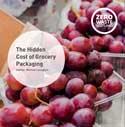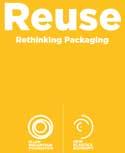Highlights
New Report Highlights The Cost Of Packaging To Scottish Households
 A new report from Zero Waste Scotland, an organization funded by the Scottish Government and the European Regional Development Fund, says that Scotland’s consumers buy groceries that use over 300,000 tonnes of single-use packaging annually. This represents a cost to the environment, but also to households – an estimated £600 million each year, much of which is hidden in product prices. This implies each household plays £250 (7% of the average grocery bill) a year for 130kg of single-use packaging. They also have to pay some £40 million each year to local authorities for waste management. The study estimates that grocery packaging contributes 13% of all household waste in the country, of which 89,000 tonnes (29% of grocery packaging) is plastic. The report concludes that this situation can be improved by price signalling, making shoppers aware of the price they pay for packaging. [Image Credit: © ZeroWasteScot 6@ZeroWasteScot zerowastescotland.org.uk]
A new report from Zero Waste Scotland, an organization funded by the Scottish Government and the European Regional Development Fund, says that Scotland’s consumers buy groceries that use over 300,000 tonnes of single-use packaging annually. This represents a cost to the environment, but also to households – an estimated £600 million each year, much of which is hidden in product prices. This implies each household plays £250 (7% of the average grocery bill) a year for 130kg of single-use packaging. They also have to pay some £40 million each year to local authorities for waste management. The study estimates that grocery packaging contributes 13% of all household waste in the country, of which 89,000 tonnes (29% of grocery packaging) is plastic. The report concludes that this situation can be improved by price signalling, making shoppers aware of the price they pay for packaging. [Image Credit: © ZeroWasteScot 6@ZeroWasteScot zerowastescotland.org.uk]
Estonian Startup Launches Water-Soluble Plant-Based ‘Honey Balls’
 Estonian startup Decomer has developed a plant-based biodegradable packaging material. The company is now incorporated in the US. Decomer’s first product is water-soluble packages for honey, called “honey drops”. They are capsules to be stirred into hot drinks. It will be available at retail and via a dispenser for food service. The company aims to develop a B2B business, selling packaging solutions to manufacturers and is developing packages that can be blended in smoothies, flavour packets that can be dissolved in water, and detergent packs that can be added to laundry. [Image Credit: © Decomer Technology Oü]
Estonian startup Decomer has developed a plant-based biodegradable packaging material. The company is now incorporated in the US. Decomer’s first product is water-soluble packages for honey, called “honey drops”. They are capsules to be stirred into hot drinks. It will be available at retail and via a dispenser for food service. The company aims to develop a B2B business, selling packaging solutions to manufacturers and is developing packages that can be blended in smoothies, flavour packets that can be dissolved in water, and detergent packs that can be added to laundry. [Image Credit: © Decomer Technology Oü]
Reuse Models Through The New Plastics Economy Lens
 The Ellen MacArthur Foundation’s New Plastics Economy initiative published research it has conducted on how to convert some 20% of global plastic packaging into reuse models, and how this could represent a US$10 billion opportunity for business. The study looked at over 100 initiatives and interviewed more than 50 experts. The report identified six key benefits in reuse models: lower packaging and transportation from using refills in a compact form (e.g. concentrates and solids); more consumer control over the product; brand loyalty and customer retention through deposit and reward schemes; improved user experience; optimized operations, such as economies for scale in standardizing reusable packaging; and opportunities to gather information on consumer preferences by incorporating digital technologies (RFID tags, GPS, and sensors) in reusable packaging. The study also looked at four main reuse models (refill at home; refill on the go; return from home; and return on the go), and presented 69 examples, across a range of categories.[Image Credit: © ELLEN MACARTHUR FOUNDATION]
The Ellen MacArthur Foundation’s New Plastics Economy initiative published research it has conducted on how to convert some 20% of global plastic packaging into reuse models, and how this could represent a US$10 billion opportunity for business. The study looked at over 100 initiatives and interviewed more than 50 experts. The report identified six key benefits in reuse models: lower packaging and transportation from using refills in a compact form (e.g. concentrates and solids); more consumer control over the product; brand loyalty and customer retention through deposit and reward schemes; improved user experience; optimized operations, such as economies for scale in standardizing reusable packaging; and opportunities to gather information on consumer preferences by incorporating digital technologies (RFID tags, GPS, and sensors) in reusable packaging. The study also looked at four main reuse models (refill at home; refill on the go; return from home; and return on the go), and presented 69 examples, across a range of categories.[Image Credit: © ELLEN MACARTHUR FOUNDATION]
Coke Turns In Strong 2nd Q Financials, Paints Rosier Growth Picture
 Coca-Cola reported healthy second-quarter 2019 results, as earnings and sales beat Wall Street estimates. Shares were up five percent in morning trading after the company raised its revenue forecast; Coke now expects organic revenue growth of five percent rather than four percent. Second-quarter earnings of 63 cents a share beat the Zacks consensus of 62 cents. The bottom line also improved four percent from the year-ago period, driven by a focus on consumer-centric innovation, solid core brand performance, and improved execution in the marketplace. Currency translations negatively impacted earnings by nine percent. Revenues of $9.997 billion also surpassed consensus estimates and increased six percent year over year. Organic revenues grew six percent. The company raised its revenue forecast, after noting that concerns about economic uncertainty had faded. “We saw some clouds on the horizon, too,” CEO James Quincey said. “But the storm never arrived, so by sticking to our plan, by executing against our strategy, we’ve been able to deliver stronger momentum than even we were expecting.”[Image Credit: © THE COCA-COLA COMPANY]
Coca-Cola reported healthy second-quarter 2019 results, as earnings and sales beat Wall Street estimates. Shares were up five percent in morning trading after the company raised its revenue forecast; Coke now expects organic revenue growth of five percent rather than four percent. Second-quarter earnings of 63 cents a share beat the Zacks consensus of 62 cents. The bottom line also improved four percent from the year-ago period, driven by a focus on consumer-centric innovation, solid core brand performance, and improved execution in the marketplace. Currency translations negatively impacted earnings by nine percent. Revenues of $9.997 billion also surpassed consensus estimates and increased six percent year over year. Organic revenues grew six percent. The company raised its revenue forecast, after noting that concerns about economic uncertainty had faded. “We saw some clouds on the horizon, too,” CEO James Quincey said. “But the storm never arrived, so by sticking to our plan, by executing against our strategy, we’ve been able to deliver stronger momentum than even we were expecting.”[Image Credit: © THE COCA-COLA COMPANY]
Companies, Organizations
ThaiBev Acquires Chinese Coffee Processor Dongguan LiTeng Foods
Singapore-listed Thai Beverage (ThaiBev) has acquired, through its indirect subsidiary Asiaeuro International Beverage (Guangdong), a 100 percent stake in Mainland China coffee processing and trading company Dongguan LiTeng Foods. The $43,571 acquisition marks the company’s first step into China’s coffee business. ThaiBev currently owns only one distillery in China producing Yulinquan Chinese spirits. In Thailand, the company has 173 subsidiaries, including 18 distilleries, 3 breweries and 11 non-alcoholic beverage production facilities. ThaiBev has also recently acquired equity positions in Myanmar whisky maker Grand Royal Group (GRG) and in Vietnamese food and beverage giant Sabeco.
Copyright 2024 Business360, Inc.


